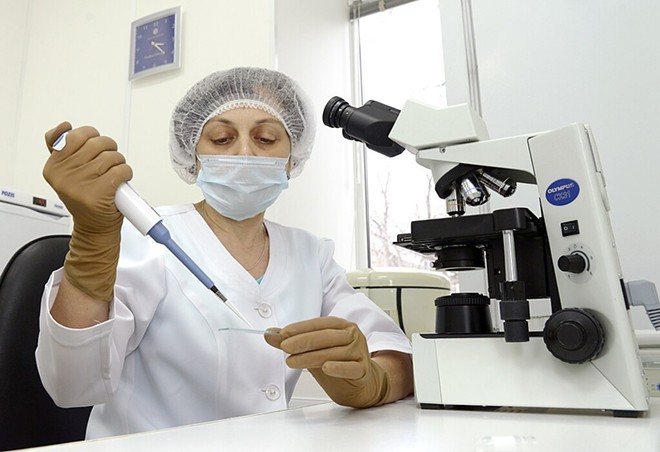
Wikimedia Commons / Galina Fomina
A girl carries out work in an in vitro fertilization lab.
Join The Temporary, The Texas Tribune’s day by day e-newsletter that retains readers up to the mark on probably the most important Texas information.
The Texas Supreme Courtroom has declined to take up a significant in vitro fertilization case that would have probably upended entry to the process.
The justices allowed a decrease court docket’s opinion to face, and, for now, sidestepped the query of whether or not a frozen embryo has the identical rights as a dwelling little one in post-Dobbs Texas.
The case facilities on Gaby and Caroline Antoun, a Denton couple who divorced in 2022. They divided up their property and settled on a custody settlement for his or her kids. The key level of rivalry, nevertheless, was the frozen embryos the couple created whereas doing IVF in 2019.
Whereas doing IVF, the couple signed a contract saying that in case of divorce, the embryos would go to Gaby Antoun, the husband. At a listening to on June 29, 2022, a decide upheld that contract and awarded him the embryos.
Two months later, Texas’ near-total abortion ban went into impact, and Caroline Antoun requested the court docket for a brand new trial. She pointed to the abortion regulation, which defines an “unborn little one” as “a person dwelling member of the homo sapiens species from fertilization till beginning, together with the complete embryonic and fetal levels of growth.”
“As a result of fertilization has occurred, the embryos are unborn kids and thus individuals as Texas defines them,” her legal professionals wrote in a short. “They’re unborn kids and must be handled as having all of the rights and constitutional protections of youngsters.”
The court docket disagreed, and Caroline Antoun appealed. The 2nd Courtroom of Appeals in Fort Price dominated that her arguments have been “a traditional instance of taking a definition out of its legislatively created context and utilizing it in a context that the legislature didn’t intend.”
“Dobbs held that the US Structure doesn’t assure a proper to an abortion,” the judges wrote. “Dobbs didn’t decide the rights of cryogenically saved embryos outdoors the human physique earlier than uterine implantation. Dobbs isn’t regulation ‘relevant’ to this case, and thus its pronouncement didn’t justify a brand new trial.”
Caroline Antoun requested the Texas Supreme Courtroom to think about the case. In an unsigned order with none remark, the court docket denied her request. Her legal professionals launched an announcement stating their disappointment with the choice.
“Whereas the Courtroom is understandably reticent to tackle such a politically scorching subject in an election yr, the issue is not going to go away,” the assertion learn. “We’re actively contemplating all attainable avenues for extra evaluation, together with requesting certiorari to the US Supreme Courtroom.”
Her ex-husband, Gaby Antoun, was happy with court docket’s choice. “I’m comfortable I can lastly deal with my household and the way forward for my children and these embryos.”
He stated he doesn’t know what his plans are instantly due to the stress concerned with the authorized case.
“Tomorrow is a day after I begin taking a look at, all the things, together with my monetary sources and my emotional standing,” Gaby Antoun stated. “And be like, okay, now we will perhaps begin drawing the plan and seeing how all the things goes to slot in my future.”
Historic precedent
Even earlier than the overturn of Roe v. Wade, courts have been referred to as on to wrestle with questions in regards to the authorized standing of frozen embryos. Within the earliest case in 1992, the Tennessee Supreme Courtroom dominated that frozen embryos have been someplace in between particular person and property, an “interim class that entitles them to particular respect due to their potential for human life.”
The Texas courts waded into the problem in 2006, when a person named Randy Roman wished his frozen embryos destroyed, as was delineated within the contract he and his ex-wife signed earlier than starting the method. His ex-wife wished to make use of the embryos.
A Texas appeals court docket dominated that it might honor the “rising majority view that written embryo agreements … are legitimate and enforceable,” a stance that “greatest serves the present public coverage of this State and the pursuits of the events.”
The Texas Supreme Courtroom additionally declined to take up that case, in order that appeals court docket ruling is the newest precedent governing this challenge.
Earlier this yr, in a high-profile case with important repercussions, the Alabama Supreme Courtroom dominated that frozen embryos qualify as individuals underneath the state’s wrongful demise statute. The state’s fertility clinics halted their work, throwing the way forward for reproductive expertise into authorized limbo till the legislature stepped in to make clear.
Whereas the main points are completely different, this case was anticipated to have comparable implications in Texas.
“Recognizing ‘personhood’ standing for a frozen embryo, as requested by Petitioner, would upend IVF in Texas,” the American Society for Reproductive Drugs wrote in an amicus temporary. It might “inject untenable uncertainty into whether or not and on what phrases IVF clinics can proceed to function in Texas.”
Juan Salinas II contributed reporting.
This text initially appeared within the Texas Tribune.
The Texas Tribune is a member-supported, nonpartisan newsroom informing and interesting Texans on state politics and coverage. Be taught extra at texastribune.org.
Subscribe to SA Present newsletters.
Comply with us: Apple Information | Google Information | NewsBreak | Reddit | Instagram | Fb | Twitter| Or join our RSS Feed





